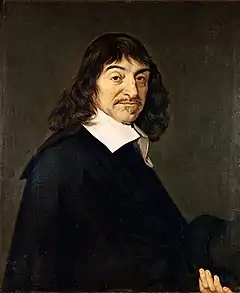ရနေး ဒေးကာ့
ရနေး ဒေးကာ့ (အင်္ဂလိပ်: René Descartes /ˈdeɪˌkɑːrt/၊[4] ပြင်သစ်: [ʁəne dekaʁt]၊ မတ် ၃၁၊ ၁၅၉၆ - ဖေဖော်ဝါရီ ၁၁၊ ၁၆၅၀) သည် ပြင်သစ်လူမျိုး အတွေးအခေါ် နှင့် သင်္ချာပညာရှင် တစ်ဦးဖြစ်သည်။
မှတ်စု
- ဒေးကာ့၏ ဤအဆိုကို မြန်မာလို "ငါတွေး၍ ငါရှိသည်" ("I think, therefore I am") ဟု အကြမ်းဖျဉ်း ဘာသာပြန်နိုင်သော်လည်း မူရင်းသုံး လက်တင်ဘာသာဖြင့် ညွှန်းဆိုခြင်းမှာ ပိုမိုတွင်ကျယ်၍ ဤအဆို၏ အမည်ကို လက်တင်ဘာသာဖြင့်သာ ထားရှိခြင်းက ပိုမိုသင့်လျော်နိုင်သည်။ (ဤအဆိုကို ဒေးကာ့က ပြင်သစ်နှင့် လက်တင်နှစ်ဘာသာသုံး၍ ရေးခဲ့သည်။)
- မြန်မာလို "ပြီးပြည့်စုံသည့် အသိပညာဘာသာစကား" ဟု အကြမ်းဖျဉ်း ဘာသာပြန်နိုင်သော်လည်း ဤ mathesis universalis ဆိုသည်မှာ ဂရိနှင့် လက်တင်ပေါင်းစပ်ထားသည့် (လူအမည်၊ နေရာအမည်ကဲ့သို့) ပုဂ္ဂလနာမ်နီးပါးဖြစ်ရာ မူရင်းအတိုင်း ထားရှိခြင်းက မိုပိုသင့်လျော်နိုင်သည်။
အညွှန်း
- Russell Shorto (2008)။ Descartes' Bones။ Doubleday။ see also The Louvre, Atlas Database
- Marenbon၊ John (2007)။ Medieval Philosophy: an historical and philosophical introduction။ Routledge။ p. 174။ ISBN 978-0-415-28113-3။
- Étienne Gilson argued in La Liberté chez Descartes et la Théologie (Alcan, 1913, pp. 132–47) that Duns Scotus was not the source of Descartes' Voluntarism. Although there exist doctrinal differences between Descartes and Scotus "it is still possible to view Descartes as borrowing from a Scotist Voluntarist tradition" (see: John Schuster, Descartes-Agonistes: Physcio-mathematics, Method & Corpuscular-Mechanism 1618–33, Springer, 2012, p. 363, fn. 26).
- "Descartes" entry in Collins English Dictionary, HarperCollins Publishers, 1998.
This article is issued from Wikipedia. The text is licensed under Creative Commons - Attribution - Sharealike. Additional terms may apply for the media files.

